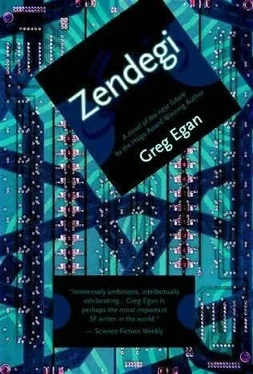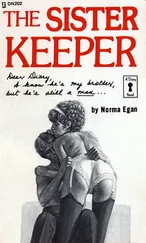Martin took his hand and they walked across the playground. ‘What did you do today?’
‘Just stuff.’
‘Nothing exciting?’
Javeed didn’t reply.
‘Any pictures for me?’
Javeed stopped and unzipped his backpack. He took out a rolled-up sheet of what Martin always thought of as butcher’s paper and offered it to him. Martin unfurled it to reveal a drawing in coloured pencil.
A bird with a dog’s head hovered over a nest on a mountainside; on closer inspection, it looked as if the nest was made of whole tree trunks. Inside the nest, a blond-haired boy stood stretching up his hands. The bird, the Simorgh, was holding a dead lamb in its claws.
‘She brought him some food?’ Martin asked.
Javeed nodded.
‘So she’s a friendly bird, she’s not too scary?’
‘She’s friendly to Zal,’ Javeed agreed. ‘But he won’t stay with her forever. His father comes and takes him back home.’
‘It’s a good picture.’
Martin rolled it up and Javeed stored it in his backpack again. Martin said, ‘No taxi today, we’re going to catch the bus.’ Javeed was surprised, then he smiled approvingly. The bus to the city took a slow, complicated route, but they caught it so rarely that it still had some novelty value.
The journey took them past the bookshop; Martin cringed a little to see the crowds walking straight by the security shutters, not even able to window-shop. He was still paying rent on the premises, frittering away Mahnoosh’s life insurance; he should make up his mind to re-open the place with an assistant, or try to sell the business. People of the Book. On the day they’d signed the lease, he’d insisted to Mahnoosh – with a straight face, for almost half an hour – that her own mildly ironic suggestion was a faint-hearted choice, and they really ought to call themselves The Nicest of the Damned.
When they reached their destination Martin apologised to Omar; they were half an hour late, and Omar always set aside two ghal’eha for them. ‘I wish you’d let me pay you what you’re missing out on.’
‘It’s once a week, it’s nothing,’ Omar retorted. ‘Ah, here’s the big warrior.’ He squatted down and kissed Javeed on the cheeks, then handed him a square of gaz.
‘Where’s Farshid?’ Javeed asked anxiously.
‘Helping someone carry a TV to their car,’ Omar said. ‘Don’t worry, he’ll be here when you’re finished.’
Martin and Javeed went upstairs on their own. They were becoming used to the mechanics of the process; after they’d put on their gloves and goggles, Martin held up his notepad to the two ghal’eha in turn. The machines read Nasim’s certificate and made the connection to Zendegi; all he and Javeed had to do was step inside. As the rim of Martin’s castle ascended, he saw one of their neighbours’ spheres spinning furiously. Even through the sound-proofing he could hear a muffled trace of its inhabitant’s rapid footfalls until his own bubble closed around him.
When Martin lowered the goggles’ screens the bland white space of the castle vanished immediately and he was standing beside Javeed at the edge of a desert oasis. No gentle, staged transitions and no menus to deal with. They had made their selection on the weekend through Zendegi’s website, sparing them all the preliminaries now.
Javeed gazed wide-eyed at the building that lay ahead of them in the distance. ‘King Zahhak’s palace!’ They’d seen pictures of the pale-brown mud-brick fortress when they’d chosen the story, but the sense of immersion, the knowledge that they’d stepped right into the picture, was already enough to render the sight far more vivid. In spite of the building material, the architecture was impressively crisp, with near-perfect scallops capping the walls above a series of narrow, slotted windows for archers. A cylindrical tower stood at each corner, with walls in exactly the same style; no fancy battlements here.
Javeed began striding across the sand, glancing towards Martin almost surreptitiously, as if he didn’t want to be caught checking that his father was keeping up. They both wore white dishdashas, traditional Arab robes; this story came from the Shahnameh but it wasn’t set in Persia. Martin had done more than enough treadmill work for one day, so he used a discreet hand gesture to tell Zendegi to amplify his steps. The result wasn’t quite seven-league boots, but it enabled his icon to walk vigorously with almost no effort on his part.
The dusty trail leading into the oasis gave way to a broad, palm-lined avenue strewn with small white stones. Horses and camels rested on the shaded grass beside the road; streams rose from beneath the ground, feeding a series of shallow pools. Javeed, usually shy with strangers, called out, ‘Salaam!’ to a group of older boys tending the animals, and they replied with friendly waves. Martin doubted that there were humans behind their welcoming smiles – who would choose to take on such a tiny role? – but he could still appreciate the warmth of their greeting for what it was, a part of the atmosphere. Nobody in a painting, a movie, a book, could ever be your friend back in the real world; that didn’t render the whole exercise deluded or dishonest.
As they drew closer to the palace the streets filled with people and they found themselves weaving through a crowded bazaar. For their benefit, everyone around them was speaking Farsi – albeit without the usual modern colloquialisms, and in accents that sounded plausibly Arabic to Martin’s ear, down to ‘w’ in place of ‘v’ and ‘b’ in place of ‘p’. Customers were haggling with traders for bolts of cloth, jewellery, fruit, grain, spices. Martin felt a pang of guilt at the sheer profligacy of the backdrop – surely software couldn’t conjure all of this effortlessly; surely some human designer had slaved for days to get the details right? – but then he decided that it was probably all recycled, with a little tweaking, from one setting to the next. There were a thousand games and stories that would need a bazaar like this; once all the elements were set up, changing the faces and permuting the merchandise would probably be easy enough.
Javeed stopped, confused. ‘Where’s the man who’ll give us the job?’
‘We have to go through the bazaar to the side of the palace. Remember?’
‘He doesn’t have an office here?’
Martin smiled. ‘I don’t think so.’ Maybe it made sense that the king’s elaborate domestic bureaucracy ought to have a recruitment centre out in the bazaar, but the notes on the website had pointed them towards the palace kitchens themselves.
At Martin’s urging, Javeed asked directions from a carpet merchant; they didn’t have time to get lost in this maze. The woman’s instructions led them past an unsavoury-looking garbage dump; it was mercifully incapable of sharing its aromas, but the buzz of flies alone was enough to turn Martin’s stomach.
There was a bead-curtained doorway at the kitchen’s entrance to keep out the insects without blocking the passage of air. Martin parted the curtain with his hands, wondering for a moment if Zendegi was tweaking the physics to ensure that not one bead brushed his face or shoulders and punctured his suspension of disbelief. The room was dim after the afternoon sunshine; when his eyes had adjusted he saw sacks of rice and legumes, and shelves stacked with earthenware bottles.
A harried-looking middle-aged man came through from an adjoining room. He introduced himself as Amir and greeted them politely, but it was clear that he expected them to explain their business without delay. Against all plausible cultural norms, it was Javeed he engaged with directly.
‘We’re looking for work,’ Javeed explained.
‘Really? What can you do?’
Читать дальше











